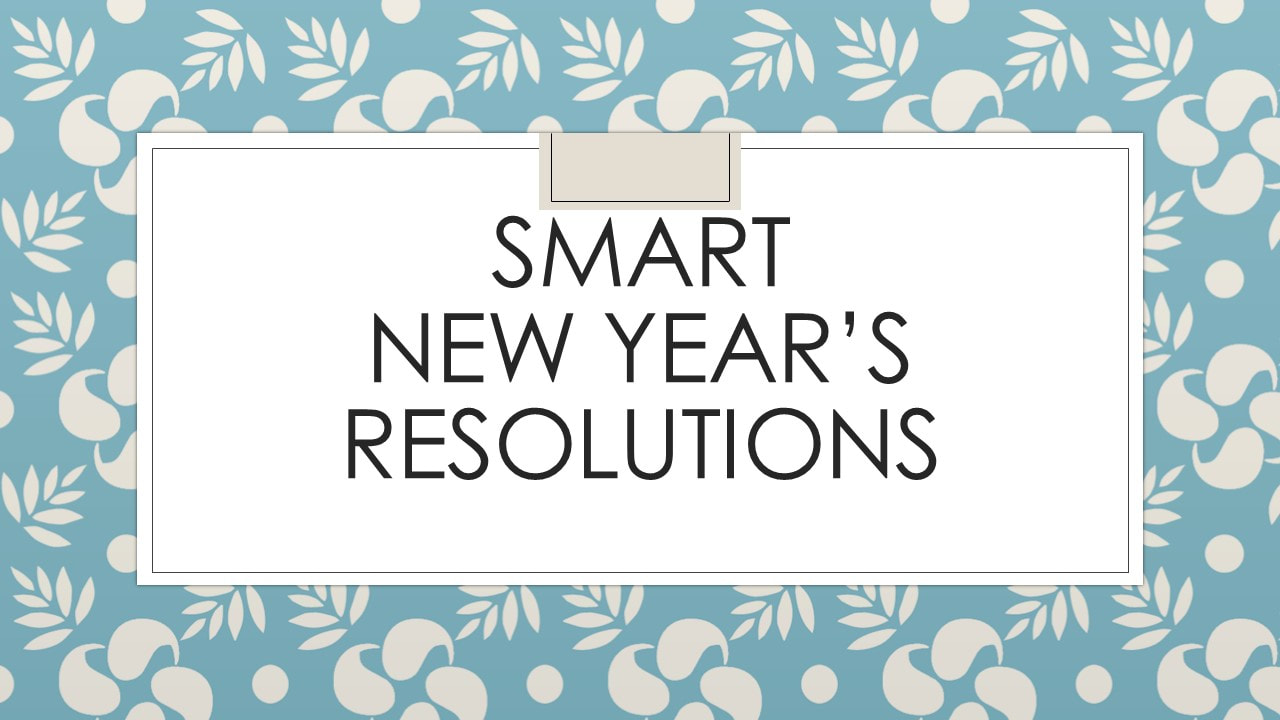 Building on the last blog of making holistic New Year’s resolutions, another method I’ve learned to set effective New Year’s resolutions is having SMART goals. This helps create realistic goals that I can tell at the end of the year if I’ve accomplished them or not. Too many times I’ve had broad aims in January I failed to revisit during the year. Then I’m startled at the end of the year when I didn’t meet them. Someone then told me about a SMART method to better make and keep my goals. The SMART acronym is Specific, Measurable, Achievable, Results-focused, and Time-bound. I will walk you through the logic of these categories and give examples so you understand how best to set your goals. S – Specific This area has plagued me in the past when making goals. Sometimes I made ambiguous resolutions so I could say I met them, when really I had no idea if I did any better than the year before or not. For example, some of my previous nonspecific goals included things like: “Drink more water.” Or “Eat more vegetables.” You can see the inherent difficulties with meeting these goals with the questions they raise. More than what? More than last year? More than someone who is a carnivore and doesn’t eat vegetables? It gets really murky. In some ways, I could feel good if I felt I drank more water, but there was nothing specific I could do to prove I had completed the goal for the year. A better way to make these goals more specific is to define quantities. “Drink at least five glasses of water daily.” OR “Eat at least two vegetables daily.” M – Measurable As you can see from my examples above, not only were they not specific, they were also not measurable. Even the updated versions have some element of measurability incorporated into them, but they do not include specifics. Better examples would be: “Drink at least five 8 ounce glasses of water daily.” OR “Eat at least two full servings of vegetables daily.” This differentiates between five shot glasses of water daily verses five 20 ounce bottles of water daily. The same with the vegetables. It is not just two carrots a day, but two full servings of vegetables. A – Achievable I have learned to make goals I can complete given my individual talents and abilities. When I aim to do things I am interested in, I am much more likely to achieve them. My goals will be different than yours because we have different interests. Also, I don’t want to overreach and continually frustrate myself when things don’t work out, but need to stretch myself so I don’t stagnate. I need balance. It would be unrealistic for me to try to switch to becoming a vegetarian. That is why eating two full servings a day of vegetables should usually be achievable. That said, be aware life doesn’t always go as planned. Sometimes I do everything in my power to complete a goal and it doesn’t happen. Once I was on a work trip where all we had was meat and potatoes in Germany. It seemed impossible to get two full servings of vegetables daily. That is ok, life happens. As soon as possible, I ate two full servings of vegetables daily. Other times when my plans haven’t worked, I needed to reexamine and see if that is something I needed to keep striving towards. A personal example is when I made a goal to go on a hot air balloon ride. I called several hot air balloon sites until I made a reservation. Then due to weather and other unforeseen impediments, either the company cancelled my reservation or I did—five times. So I gave up. It wasn’t the right time. Fortunately, several years later, the weather was great, the timing was right, and I finally went on a hot air balloon ride. And it was even better because I went with my sister. My original plans didn’t include her, and I probably wouldn’t have gone again had I already gone. I still completed my goal, but in a different time and place. And it was more than OK, it was Great! R – Results-focused I know typically, experts say to focus on the results. This may entail breaking down goals into intermediary steps to help reach the desired results. Sometimes big goals may seem intimidating, but when I break them down into smaller elements, it makes the entire process less daunting. Also, it lets me gauge my progress towards fulfilling my goals as I go. I don’t have to wait until the end to feel like I are getting somewhere. Here is an example: “Eat at least two full servings of vegetables daily. Research types of vegetables that are best for my health. Find tasty recipes so I want to eat more vegetables.” I want to go beyond being results focused and give some additional insight. Yes, I want the final result where everything goes as planned. But sometimes I can’t achieve everything, even when I try my hardest. So I’m learning to focus on the process. I ask myself - What am I learning while I move towards the goal? I have always been a “get her done” kind of person. However, God is showing me it is better to focus on more than just the end result. The process is where I learn and grow the most. When I rush through everything to cross items off my checklist, I miss the joy of living. I don’t want my life simply to be a crossed off to do list. What I do while I work to cross off those items is my actual life. I want to enjoy the only life I get. Also, for when I know it is partially my fault things didn’t go as I wanted– those times are covered by grace. No one is perfect. That is why Christ lived a perfect life to take the punishment for my sins and reconcile me to a right relationship with God. So, focus on the results, but don’t miss the lessons in the process. T - Time-Bound I have learned I must set specific time frames in which to achieve my goals. In 2008, I set a goal to write a Bible study, but didn’t have any timeline. It is now nearly ready for self-publication in 2018, ten years later. Give me a deadline, and I will strive to meet it. Without a deadline, I flounder. I need the accountability a deadline implies. Because I’m writing these goals in January, a year may be a logical time frame. However I need to review my goals at least on a quarterly basis or even monthly. Many times I’ve made goals then forgotten to review them until October and rushed to complete them. When I routinely checked my lists, I accomplished much more. Some ideas to help remember goals putting reminders on the calendar or in a phone. Now that I’ve reviewed how to have SMART resolutions, I’ve updated my holistic goals from last week to make them SMARTer. I added some specifics, time frames, and intermediary steps I need to make to accomplish larger goals. I also put notifications on my calendar to do quarterly reviews of my resolutions so I don’t forget what I am working towards. Physical – Workout at the gym or exercise at least twice a week. Bring my Bible or spiritual books to read at the gym to think about deeper spiritual things and know God better. Mental – Go to the Blue Ridge Christian Writer’s Conference in May to learn more about writing. Publish a short story by the end of 2018. To write a story ready for publication, participate in monthly writer’s meetings for accountability. Pray diligently before, after, and between writing so it honors God and blesses the readers. Spiritual – Have daily time in the Word, and at least once a week spend at least an hour in deep Bible study and meditation so I can understand God’s character better and deepen my relationship with Him. Jealously guard this time with the Lord so it is not lost in the busyness of life that can be all consuming. Emotional – Journal at least weekly so I can gauge where I’m at emotionally and review it with God so I can draw closer to Him in the process. What do you think about my updated, holistic, SMART resolutions? Are there any steps I am missing or things I could add to hone my resolutions?
0 Comments
|
AuthorJoanna Eccles has led Bible studies for over twenty years and completed the year-long C. S. Lewis Fellows Program. She is passionate about discipleship and helping people grow in Christ. Joanna enjoys coffee and reading, and currently lives in Florida. Categories
All
|
© COPYRIGHT 2018. ALL RIGHTS RESERVED.

 RSS Feed
RSS Feed